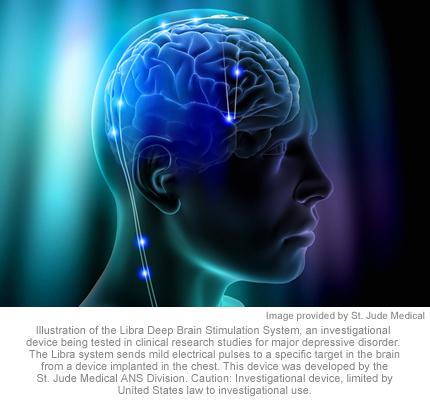 The study, called BROADEN™ (BROdmann Area 25 DEep brain Neuromodulation), is a controlled, multi-site, blinded study that is evaluating the safety and effectiveness of DBS in patients with depression for whom currently available treatments are not effective.
The study, called BROADEN™ (BROdmann Area 25 DEep brain Neuromodulation), is a controlled, multi-site, blinded study that is evaluating the safety and effectiveness of DBS in patients with depression for whom currently available treatments are not effective.
“We are excited to be part of the first double-blind study of Deep Brain Stimulation for depression and remain hopeful that this therapy may prove beneficial for this seriously ill patient population,” said Anthony D’Agostino, M.D., medical director of Alexian Brothers Behavioral Health Hospital and the principal investigator at the study site. “The study is an important contribution to the advancement of treatment options for severely depressed patients.”
This study is researching a specific area in the brain called Brodmann Area 25 that is thought to be involved in depression. The first research of DBS for depression was conducted in Toronto, Canada, by neurologist Helen S. Mayberg, M.D., and neurosurgeon Andres Lozano, M.D., in 2003. They published their findings in Neuron in March 2005, reporting that brain imaging studies indicate that Brodmann Area 25 appears to be overactive in profoundly sad and depressed people. [continue reading…]
The BBC news reports on a Nature Neuroscience study which found that mice with increased levels of the hormone showed fewer signs of depression and anxiety.Â
High levels of the “hunger hormone” ghrelin have an antidepressant effect, US researchers claim.
Blocking the body’s response to ghrelin has been suggested as a weight loss treatment but it may also produce unintended effects on mood, they said.
Link to read this BBC news feature
 Link to Abstract
UT Southwestern Medical Center psychiatry researchers have taken what they learned from their groundbreaking research on treating depression and are applying it to real-world clinical settings.
The Sequenced Treatment Alternatives to Relieve Depression (STAR*D) study was the largest ever on the treatment of major depressive disorder and is considered a benchmark in the field of depression research. The six-year, $33 million study initially included more than 4,000 patients from clinics across the country.
STAR*D provided evidence for step-by-step guidelines to address treatment-resistant depression and found that half of depressed patients became symptom-free or had major improvement after the first two treatments with medication [continue reading…]
Mayo Clinic research suggests unmarried women living in rural areas have lower self-rated health status than their married counterparts. This lower health status often includes greater instances of self-assessed feelings of depression. The results of the study were recently published in the Journal of Evaluation in Clinical Practice. They suggest that primary care physicians should take a proactive role in addressing health concerns of single women.
“We tend to focus on disease, but as the World Health Organization notes, good health includes physical, mental and social well-being and not merely the absence of disease,” says James Rohrer, Ph.D., of Mayo Clinic’s Department of Family Medicine and lead author of the study. “Being single may be associated with a greater degree of separation from usual health care, as many women gain insurance through a spouse or a former spouse. Lack of social support also may contribute to poor health among some single women.” [continue reading…]
 The study, called BROADEN™ (BROdmann Area 25 DEep brain Neuromodulation), is a controlled, multi-site, blinded study that is evaluating the safety and effectiveness of DBS in patients with depression for whom currently available treatments are not effective.
The study, called BROADEN™ (BROdmann Area 25 DEep brain Neuromodulation), is a controlled, multi-site, blinded study that is evaluating the safety and effectiveness of DBS in patients with depression for whom currently available treatments are not effective.